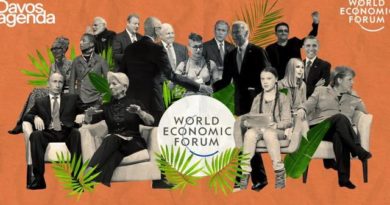How the ‘great reset’ of capitalism became an anti-lockdown conspiracy

At a recent anti-lockdown protest in London, thousands of people gathered to oppose what they saw as a clandestine power grab taking place under the cover of a pandemic. Some protesters carried cardboard signs bearing the name of the alleged takeover: “The great reset”. “They thought they could easily get their great reset,” one man shouted. “Little did they know! The pandemic’s a hoax!”
The great reset, both the title of an airport book by the creative economy guru Richard Florida and a slogan favoured by corporate do-gooders, is also the term for a web of ideas that has become increasingly popular among the anti-lockdown right. In its most implausible version, this conspiracy imagines that a global elite is using Covid-19 as an opportunity to roll out radical policies such as forced vaccinations, digital ID cards and the renunciation of private property.
Though a poor diagnosis of the causes of global events, the great reset offers a grim insight into the public mood. An unlikely source provided its initial spark. On 3 June, as the UK’s Covid death toll reached 50,000, the royal family’s YouTube account posted a video about a new sustainability drive headed by the Prince of Wales’s Sustainable Markets Initiative, in partnership with the World Economic Forum (WEF). Titled #TheGreatReset, the initiative called for “fairer outcomes” and the redirection of investment towards a more “sustainable future”. It had all the slick branding one has come to expect from the WEF, with a cinematic video of ice floes and beached whales, and a sonorous monologue by Prince Charles.
The initiative joined a line of similar proclamations riffing on Karl Polanyi’s 1944 urtext, The Great Transformation. In the past decade, authors and politicians have talked of the “great financialization”, the “great regression”, the “great reversal”, the “great acceleration”, the “great unraveling” and the “great uncoupling”, to name just a few. The WEF’s great reset went largely unnoticed at first, arriving at the same time as George Floyd’s death spurred Black Lives Matter protests across the world. But the idea later caught on – in a way that organisers most likely didn’t expect.
Weeks after the WEF’s announcement, Justin Haskins, the editorial director of the libertarian thinktank, the Heartland Institute, sounded klaxons about the great reset on Fox Business, Fox News and Glenn Beck’s network, TheBlaze. “The rough outline of the plan is clear,” he said. “Completely destroy the global capitalist economy and reform the western world.” Yet, apart from a few isolated yelps in the rightwing echo chamber, the great reset failed to catch on as a fully fledged conspiracy theory until Joe Biden’s victory in early November, when Google Trends shows that searches for the term surged online.
The most obvious spark for this growing interest was a segment on Laura Ingraham’s television show on Fox News, which averaged 3.5 million viewers in 2020. “You know the idea, ‘never let a crisis go to waste’,” said Ingraham on 13 November. “Well, with the coronavirus, that idea went global. And since last spring, powerful people began to use this pandemic as a way to force radical social and economic change across the continents.”
Years after the journalist Naomi Klein first identified the “shock doctrine” of radical policies that conservatives rolled out during disasters, the right was now appropriating this narrative for its own ends.
A few days later, Ingraham returned to the theme. In a clip viewed some 2.4m times, she said Biden’s “handlers” believe in “the great reset of capitalism. It’s a plan to force a more equitable distribution of global resources.” The same day, another Fox host, Candace Owens, tweeted: “They are using Covid to crash western economies and implement communist policies. That’s what’s going on.” And in Australia, the Spectator columnist James Delingpole was interviewed on Sky News Australia (which, like Fox News, is owned by Rupert Murdoch). “Anyone who doesn’t realise that the great reset is the biggest threat to our form of life right now hasn’t been paying attention,” he said.
The great reset theory is nonsense, and will probably become a prime target for the many new research centres and initiatives studying “disinformation” that have mushroomed on university campuses since 2016. But although we may scorn the ideas of anti-lockdown protesters, we ignore the unequal reality of the pandemic at our peril. Many of the world’s tech companies and CEOs have done well from this crisis. Indeed, in the same week that many Americans lost their jobs, Jeff Bezos, the founder of Amazon, added $13bn to his fortune in just a day. With surreal realities like these, where prominent members of the 1% really do appear to have gained from the pandemic, how much of a leap is it to persuade someone that the crisis has been orchestrated deliberately so that elites can amass power?
The genius of Murdoch’s hosts was giving people a place to direct their anger. With his thick German accent and outpost in the Swiss Alps, the WEF’s founder, Klaus Schwab, labelled a “charismatic German” and “dangerous Marxist leader” by Sky News Australia, was the perfect villain for this conspiracy. For rightwing pundits, the great reset was also a welcome distraction from their own complicity with power and wealth, having spent four years cheerleading a president whose major legislative achievement was a mammoth tax cut that disproportionately benefited the rich.
That the WEF has inspired a conspiracy about elites is unsurprising; the organisation is best known for its annual gathering in Davos, Switzerland, when top corporate executives arrive in fleets of private jets to pay lip service to climate change. While Schwab has pronounced that “neoliberalism has had its day”, it is left to his critics to remind the WEF of its record, such as its publication of an annual “global competitiveness index” that has, since the 1970s, flogged national governments into a race to the bottom to adopt lower taxes and slash regulations.
If the great reset tells us anything about political reality, it’s that corporate elites can’t win legitimacy through vacuous initiatives. People recoil, it turns out, at being treated like buggy hard drives that can be reset from above. Changing the conditions of people’s lives and the causes of political alienation will take far more than the WEF’s tone-deaf video about the opportunities of a pandemic, fronted by the royal family. It’s social movements such as Black Lives Matter and the climate strikers, not boardroom initiatives, that offer a better lesson in how to gather popular support for the transformations we need.
• Quinn Slobodian is an associate professor of history at Wellesley College, Massachusetts
*** This article has been archived for your research. The original version from The Guardian can be found here ***


